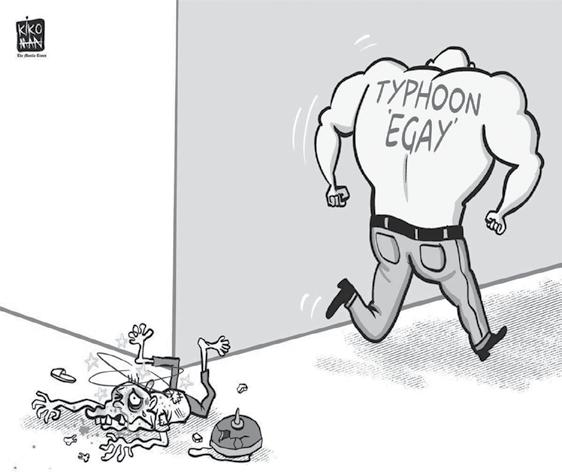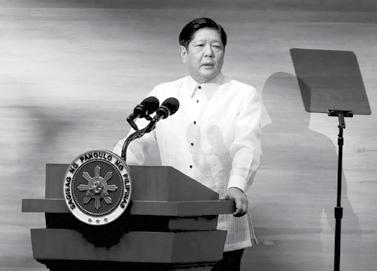
7 minute read
Marcos year 2: A political reckoning?
bust cycles in the early modern era. His intellectual successors, most notably Alan Greenspan, spoke of “irrational exuberance.” In politics, cognitive biases shape voter behavior.
ONE of the greatest illusions of the 20th century was the presupposition that humans are fundamentally rational beings. But just as the Great Recession of 2007-2008 reminded the world of the limits of mainstream economies, with its delusions of efficient and self-correcting markets scaffolding public policy, the recent wave of populist revolts across the world’s oldest democracies has undermined faith in mainstream political science. This doesn’t mean that human beings are irrational per se, but instead that we are complex and multifaceted species.
Advertisement
The great economist John Maynard Keynes often spoke of “animal spirits” as the driving force behind capitalist boom-and-
Virtual Reality
THE State of the Nation Address (SONA) is basically a Statement of All National Aspirations (SANA) of any Philippine president, especially in the first three of his six-year presidency.
Thus, it was not surprising that the second SONA of President Ferdinand Romualdez Marcos Jr. received no less than 70 rounds of applause, despite his long and tedious but marvelous delivery of one hour and 11 minutes.
The projects and programs enumerated in PBMM’s SONA are the most ambitious, farreaching and wide-ranging ever made by any Filipino president. This explains the enthusiastic rounds of applause. Congress and the nation join Marcos II in his dreaming. Sana all, as they say.
For the first time, noted Albay Rep. Joey Salceda, “we have a president who is engaged in nation building.” Well, the first president to do nation-building was PBBM’s father, Ferdinand Marcos Sr., and he needed 20 years to do the job.
Marcos II has only five years to implement or finish the projects and programs enumerated in his SONA II. Still, at the end of his 8,275-word address, the president beamed, in Pilipino, “the new Philippines has arrived!” Hoots and thunderous applause.
As Nobel laureate Daniel Kahneman argues: even the smartest and most intellectually accomplished human beings are not impervious to seemingly irrational behavior. This is primarily due to evolutionary biology, namely the whole package of defense mechanisms our ancestors had to develop in order to survive the Savannah of pre-historic times.
At the heart of human behavior is an ingrained instinct to respond to the primordial forces of fear and greed. Reason, as Scottish philosopher David Hume correctly explained centuries earlier, can often end up as the slave of passions. And dear reader, this is precisely where our analysis of the simultaneous
One word connects all the BBM projects: Connectivity. It means infra – roads, bridges, seaports, airports and mass transport. It means access – to food, water, electricity, health care, quality education and all things digital.
Marcos II’s infra is mindboggling: 194 projects, of which 120 are new, and they will cost P8.3 trillion (P9 trillion with inflation) and average 5 to 6 percent of GDP per year.
Infra includes huge projects thought of in the last 50 years but never implemented:
1) 1,000 kms of railways to restore the old Philippine National Railways network from north to Bicol; ascent of the House of Duterte and (reemergence of) the House of Marcos should be understood. This is less about the supposed irrationality of our voters, but instead about the impact of our “age of uncertainty” on modern democracies. As in countless voters in India, Brazil, Indonesia, and Turkey—not to mention America’s Midwest, rural France, and England’s northern regions—authoritarian populism’s appeal to Filipinos is in its ability to provide (false) certainty and (fantastical) promise of prosperity amid (real and manufactured) crises.
Rodrigo Duterte’s populist presidency was enabled by a climate of fear, while Ferdinand Marcos Jr.’s emphatic return to power was the upshot of deep-seated grievances against dysfunctions of quasidemocratic politics. The power of disinformation was both a symptom of systemic dysfunction foreign debts. as well as an amplifier of a climate of fear and rage, which decimated mainstream liberal politics for the foreseeable future. Only shallow analysts and self-serving apparatchiks would insist that disinformation alone explains our current democratic crisis.
On food, Marcos II said “our aim is to boost our local agricultural production – through consolidation, modernization, mechanization and improvement of value chains – augmented by timely and calibrated importation, as needed.” Agriculture, as a sector of GDP, rose 2.2 percent in the first quarter. Its average growth per capita in 30 years: 0.2 percent per year.
Nevertheless, President Marcos’ political honeymoon won’t last forever. Sure, he is a beneficiary of the failures of both his immediate predecessor, who disastrously mismanaged both the COVID-19 pandemic as well as our external relations, as well as the shortcomings of numerous reformist-liberal presidents in the past three decades.
The reason why Mr. Marcos has been, quite ironically, welcomed as a “breath of fresh air” by the West is not necessarily because of what he does, but instead what he doesn’t: namely, his retrenchment of the worst aspects of the Duterte an increase in supply, and not a supply adequacy. Water shortage is strange for a country two-thirds of whose territory is – water. He wants a Department of Water, pronto, from Congress. presidency, including a bloody drug war, a slavish predisposition toward Beijing, and a needlessly pugnacious attitude toward critics.
On energy, Marcos II said “renewable energy is the way forward. We are aggressively promoting renewables, so that it provides a 35 percent share in the power mix by 2030, and then on to 50 percent by 2040.
In this sense, any appreciation of Mr. Marcos’ first year in office is often driven by what can be described as “reference bias,” namely, how the incumbent is an improvement relative to his immediate predecessor. For loyalists, meanwhile, he is seen as a harbinger of a new “golden era” of illiberal politics.
Having picked all the lowhanging fruits, however, Mr. Marcos faces hard choices in his second year in office. He will soon have to decide how far he is willing to align with the United States amid a raging New Cold War in Asia. This has implications not only for his outreach toward Beijing, but also for pro-China elements within his own ruling coalition.
Not to mention, Mr. Marcos will also have to decide how far is he going to shield his predecessor against probable International Criminal Court investigations. Perhaps most crucially, Mr. Marcos will also have to decide how far he is willing to shake up the Philippines’ oligarchic economic system in order to bring about transformative reforms, which ensure inclusive and sustainable development.
Soon, the president will discover that political rebranding alone isn’t a sufficient basis to govern one of the world’s most populous nations and a key player in the emerging New Cold War in the Indo-Pacific. (Inquirer.net)
* * *
The opinions, beliefs and viewpoints expressed by the author do not necessarily reflect the opinions, beliefs and viewpoints of the Asian Journal, its management, editorial board and staff.
* * * rheydarian@inquirer.com.ph
2)
1,200 kms of highways from Pagudpud to Bicol to cut travel time from 20 hours to nine; plus
3) 12 bridges spanning 90 kms to connect Bataan and Cavite, Panay, Guimaras and Negros; and Samal and Davao.
“The underlying logic to our infrastructure development is economic efficiency. We are opening up all gateways to mobilize goods and services at less cost and in less time and, ultimately, to drive the economy forward. Our road network plans must link not only our three major islands, but all prospective sites of economic development,” explained Marcos II.
Financing will come from investments. Marcos claimed having generated $71 billion in investment pledges in his trips. That money can fully pay Phl
The president wants more farm and fisheries cooperatives. About 900 coops have been formed recently involving 200,000 hectares of farm lands. Technology will boost fertilizer output. Farm machinery will be deployed; over 20,000 have been distributed so far. Irrigation has been provided to additional 49,000 hectares.
The president has vowed to run after food smugglers, hoarders and price manipulators. “Your days are numbered,” he warned. Does that mean they will be EJKed?
Will the food shortage, quite severe, be solved? Don’t bank on it.
Rice will forever be in short supply. The Philippines needs to import two million to three million tons yearly to cover a 25 percent perennial food shortage. Overseas, wheat has gone scarce, thanks to the Ukraine war. India, supplier of 40 percent of rice exports, has banned exports. Water? The president promises
To accelerate the realization of this green energy goal, we have opened renewable energy projects to foreign investments.”
And, “an additional 126 renewable energy contracts with potential capacity of 31,000 megawatts have been awarded.
To date, we have over a thousand active projects spread all over the country: 299 of these are solar; 187 are wind; 436 are hydroelectric; 58 biomass; 36 geothermal and 9 are ocean-powered.”
The contract for Malampaya, supplier of 20 percent of our electricity, has been renewed.
Usually, 1,000 MW of sustained power is equivalent to one full hour of reliable power. So 31,000 MW could mean 31 hours daily of additional electricity. Sounds good, on paper.
Meanwhile, “digitalization is the call of today; not the call of the future – but of the present. It is here. It is needed, and it is needed today,” the president said, for government “to provide better service to the people, through its vital frontline services and its back-end functions.”
Digitalization “is the greatest, most powerful tool, not just to improve the ease of doing business, but also against many forms of graft and corruption,” he said.
Digitalization “has significantly boosted efficiency… in the areas of government payments, company and business registrations, issuance of permits and licenses, loan applications and revenue collection.”
“All our digitalization efforts will be linked to our payment systems, whose digital transformation has been accelerating at a remarkable rate.”
About 87 percent of Filipinos that need a national ID have it by now. Internet speeds remain dismal. Phl ranks 83rd out of 142 countries. Phl is the 12th largest nation on earth.
Marcos II pleaded: “Our journey to progress requires not only unity and social cohesion among our people. It is also imperative that our nation remains intact and inviolable, our sovereignty preserved. We will protect our sovereign rights and preserve our territorial integrity, in defense of a rules-based international order.” [applause] (Philstar.com)

* * *
The opinions, beliefs and viewpoints expressed by the author do not necessarily reflect the opinions, beliefs and viewpoints of the Asian Journal, its management, editorial board and staff.
* * *
Email: biznewsasia@gmail.com






